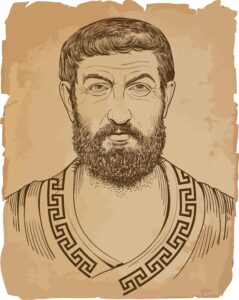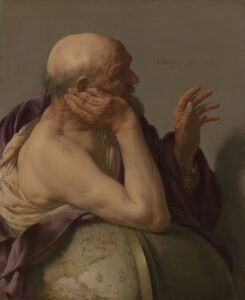Parmenides vs. Heraclitus
Grades 9+
There are two types of people: those who prefer things to stay the same and those who like to try new things and accept change.
Which one are you? Do you stay in your comfort zone, or do you take risks and explore? It may be less about personal preferences, and more about the universe and nature of reality itself. It’s about how the world works and how you interact with it.
In the early Greek philosophy, known as the pre-Socratic period, people wondered how the universe began and what it was made of. For many years, philosophers debated whether the universe is in permanent stasis or in constant flux. Is it always the same, or is it always changing?
Parmenides and Heraclitus, two of the top philosophers of the time, disagreed on the question.
 Parmenides argued that reality is unchanging and that change is only an illusion created by our senses. For him, everything is unchanging and eternal. No matter what exists, it will always be that way and nothing can change it. This is called stasis, which means that the universe is always in balance. Things either exist or they don’t exist, and they can’t change. Nothing ever really changes. It just looks like it does.
Parmenides argued that reality is unchanging and that change is only an illusion created by our senses. For him, everything is unchanging and eternal. No matter what exists, it will always be that way and nothing can change it. This is called stasis, which means that the universe is always in balance. Things either exist or they don’t exist, and they can’t change. Nothing ever really changes. It just looks like it does.
 Heraclitus, on the other hand, believed that the universe is in constant flux, that everything is always changing, and that it is impossible to step into the same river twice. Heraclitus argued that nothing ever remains the same, and that the world is in a constant state of transformation. Aging and rivers are examples of how the universe is constantly changing. As you age, your body changes, and you become different than when you were earlier. Rivers are always flowing and changing. Every time you step into a river, the water is different. You can never step into the same river twice.
Heraclitus, on the other hand, believed that the universe is in constant flux, that everything is always changing, and that it is impossible to step into the same river twice. Heraclitus argued that nothing ever remains the same, and that the world is in a constant state of transformation. Aging and rivers are examples of how the universe is constantly changing. As you age, your body changes, and you become different than when you were earlier. Rivers are always flowing and changing. Every time you step into a river, the water is different. You can never step into the same river twice.
But even though the river is always changing, we are able to recognize it as a river because our perception of what a river is remains the same. That idea can also be applied to the universe. Even though everything is always changing, there are certain things that remain the same, such as the laws of nature. We can rely on these unchanging laws, even when everything else around us is constantly changing.
The clash between Parmenides’s stasis and Heraclitus’s flux was a draw. That impasse opened the door for a completely new philosophy – that of Socrates.
Parmenides vs. Heraclitus Activity 1
Find the words below in the essay. Then fill in the blanks of the noun test. For example:
runners
The ______________________.
The runners.
Some words will not fit. Skip those. Don’t identify their part of speech. For example:
enjoy
The enjoy
Write N after all the words that are nouns. Don’t worry about the others. Use the noun test: noun = the ______
1. types | 4. risks | 7. universe | 10. illusion | 13. you |
2. people | 5. exploration | 8. philosophy | 11. senses | 14. idea |
3. things | 6. preferences | 9. question | 12. existence | 15. is |
Parmenides vs. Heraclitus Activity 2
Repeat Parmenides vs. Heraclitus Activity 2. But this time you sometimes you will fill in the second blank. To do that, you may need to fill in the first blank with a word that is not on the list. For example:
Camelot
The ______________________ named __________________________.
The Camelot. The kingdom named
Camelot.
Some words will not fit either blank. Skip those. For example:
about
The about The person named about
Identify the nouns in the list below. Take into account how the word is used in the essay.
Write N after all the words that are nouns. Don’t worry about the others.
Use the noun test: noun = the ______ OR the _______ named _______
1. Greek | 4. door | 7. impasse | 10. water | 13. parchment |
2. Socratic | 5. Rivers | 8. Socrates | 11. water | 14. akousmatikoi |
3. Parmenides | 6. Heraclitus | 9. Aging | 12. river | 15. accept |